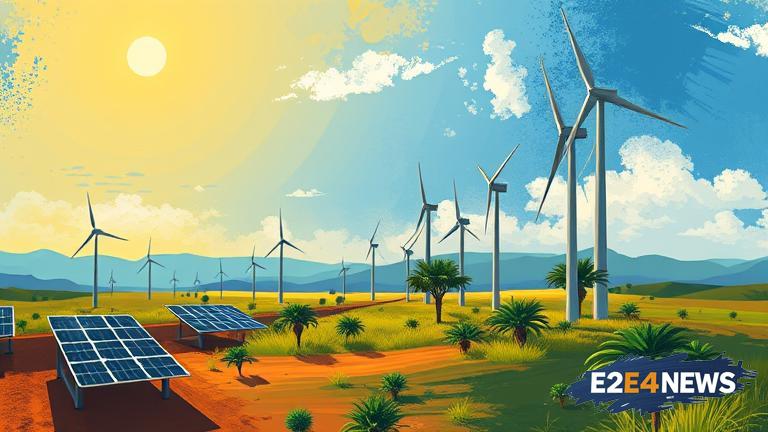The African continent is undergoing a significant transformation in its energy landscape, with a growing number of countries investing heavily in renewable energy sources. This shift is driven by the need to reduce dependence on fossil fuels, mitigate climate change, and provide access to electricity for the millions of Africans who currently lack it. According to recent reports, Africa’s renewable energy capacity has increased significantly over the past decade, with solar and wind power leading the charge. Countries such as South Africa, Morocco, and Egypt are at the forefront of this revolution, with numerous large-scale renewable energy projects underway. For instance, South Africa’s Renewable Energy Independent Power Producer Procurement (REIPPP) program has been highly successful, attracting significant investment and leading to the development of several major solar and wind farms. Similarly, Morocco’s Noor-Ouarzazate solar power complex is one of the largest in the world, generating enough electricity to power over 1 million homes. Egypt, meanwhile, has set ambitious targets for renewable energy production, aiming to generate 20% of its electricity from renewable sources by 2022. Other African countries, such as Kenya, Tanzania, and Ghana, are also making significant strides in the development of their renewable energy sectors. The growth of renewable energy in Africa is being driven by a combination of factors, including declining technology costs, improving energy efficiency, and increasing investment from international organizations and private sector companies. The African Development Bank, for example, has committed to investing $25 billion in renewable energy projects across the continent over the next 5 years. The International Renewable Energy Agency (IRENA) has also launched a number of initiatives aimed at supporting the development of renewable energy in Africa, including the provision of technical assistance and capacity building programs. Despite the many successes, however, there are still significant challenges to be overcome, including the need for greater investment in energy infrastructure, the development of more effective policies and regulations, and the addressing of social and environmental concerns. Additionally, the integration of renewable energy into existing power grids and the development of energy storage technologies will be critical to ensuring a stable and reliable energy supply. Furthermore, the role of international cooperation and knowledge sharing will be essential in supporting the growth of renewable energy in Africa, with countries able to learn from each other’s experiences and best practices. The potential benefits of a renewable energy revolution in Africa are numerous, including the creation of new job opportunities, the stimulation of local economies, and the improvement of energy access and security. Moreover, the reduction of greenhouse gas emissions from fossil fuels will have a positive impact on the environment and public health. As the African continent continues to grow and develop, it is likely that renewable energy will play an increasingly important role in meeting its energy needs, reducing its dependence on fossil fuels, and promoting sustainable development. In conclusion, the growth of renewable energy in Africa is a positive trend that has the potential to transform the continent’s energy landscape, promote sustainable development, and improve the lives of millions of people. With continued investment, international cooperation, and effective policy and regulation, there is no doubt that Africa’s renewable energy revolution will gain even more momentum in the years to come. The future of energy in Africa is renewable, and it is an exciting time for the continent as it embarks on this journey towards a more sustainable and energy-secure future. As the world continues to transition towards a low-carbon economy, Africa is well-positioned to play a leading role in the development of renewable energy, with its abundant natural resources, growing economies, and increasing demand for energy. The African renewable energy market is expected to continue growing over the next decade, driven by government support, declining technology costs, and increasing investment from international organizations and private sector companies. The development of renewable energy in Africa will also have a positive impact on the environment, reducing greenhouse gas emissions and mitigating the impacts of climate change. In addition, the growth of renewable energy will create new job opportunities, stimulate local economies, and improve energy access and security. Overall, the future of renewable energy in Africa is bright, with the continent poised to play a leading role in the global transition to a low-carbon economy.
